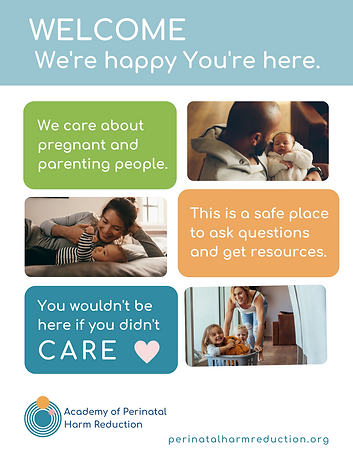PROGRAMS YOU SHOULD KNOW ABOUT:

Promoting Ethical Caregiving
"At a time when substance use disorder patients face stigma, rampant discrimination, and potential loss of custody, housing, and employment that threatens their recovery if confidentiality is breached, we must champion their rights."
Marilyn Heine, MD
AMA Women Physicians Section
"Shared decision making is a patient-centered, individualized approach to the informed consent process that involves discussion of the benefits and risks of available treatment options in the context of a patient's values and priorities."
ACOG Committee Opinion 819
Informed Consent and Shared Decision Making in Obstetrics and Gynecology
"Confidentiality and trust are at the core of the patient–practitioner relationship. Policies and practices that criminalize individuals during pregnancy and the postpartum period create fear of punishment that compromises this relationship and prevents many pregnant people from seeking vital health services.
Criminalization of pregnant people violates the pillars of medical ethics including patient autonomy, justice, beneficence, and non-maleficence."
ACOG Statement of Policy
Opposition to Criminalization of Individuals During Pregnancy and the Postpartum Period
The practice of obstetrics and gynecology presents ethical considerations that are both universal to medicine and unique to perinatal care.
PRICIPLED PROVIDERS subscribe to beliefs that promote ethical caregiving and adopt attitudes and behaviors that protect the parent-infant dyad.
HOW DOES YOUR PRACTICE COMPARE?
PATIENT AUTONOMY
We believe that you are the expert on your body and your health. We commit to providing you with care that respects your right to self-determination. We acknowledge that there are barriers to accessing quality healthcare and that the medical environment is potentially traumatic. So we will do our best to reduce the imbalance of power that can exist between patients and providers.
HARM REDUCTION
We believe that it is our responsibility to help you assess your medical needs and create a care plan to meet those needs. We care about your wellbeing. So we will work with you to identify your unique risk factors and mitigate their negative consequences. We will help you to be as healthy as you can be, even when your choices are different from what other people think you should choose.
SHARED DECISION-MAKING
We promote evidence-based medical care. We will give you as much information and guidance as you need to make informed decisions about your health care. We will never force or coerce you. We will work with you as you explore all your options, and together we will arrive at solutions that reflect your values and preferences.
INFORMED CONSENT
We will promote transparency and collaboration. Our ethical obligations as providers require that we do no harm. So we commit to protecting your health information. If we are required by law to share the results of drug screenings, we will advise you of that and we will work together to make a plan to help reduce the potential harm of that report.

Trauma-Informed Care
Supporting women with substance use issues: trauma-informed care as a foundation for practice in the NICU Lenora Marcellus
Adding to Our Practice Toolkit: Using the ACTS Script to Address Stigmatizing Peer Behaviors in the Context of Maternal Substance Use
Lenora Marcellus and Elizabeth Poag
Shared Decision-Making
Advantages for using a shared decision-making process are:
Midwives are uniquely poised to lead the maternity care community in implementing a more meaningful shared decision-making process.
Shared decision‐making in maternity care: Acknowledging and overcoming epistemic defeaters Keith Begley, PhD, Deirdre Daly, PhD, Sunita Panda, MSc, and Cecily Begley, PhD
Communications Between Pregnant Women and Maternity Care Clinicians Erika R. Cheng, PhD, MPA; Aaron E. Carroll, MD, MS; Ronald E. Iverson, MD, MPH; et al
-
higher client satisfaction
-
more positive relations among the care team
-
higher levels of trust
Informed Consent
Seeking informed consent expresses respect for the patient as a person; it particularly respects a patient’s moral right to bodily integrity, to self-determination regarding sexuality and reproductive capacities, and to support of the patient’s freedom to make decisions within caring relationships.
Don’t Examine without Me – the Role of the Patient in Learning Pelvic Exams Voices in Bioethics
SAMHSA - HSA Publication No. (SAM) 18-5054
Urine Drug Testing (UDT)
Appropriate Use of Drug Testing in Clinical
Addiction Medicine
CONSENSUS STATEMENT - American Society of Addiction Medicine (ASAM)
Adopted by the ASAM Board of Directors April 5, 2017.
Endorsed by the American College of Medical Toxicology.
Informed Consent and Shared Decision Making in Obstetrics and Gynecology
ACOG Committee Opinion, Number 819
February 2021

What Does Ethical Caregiving Look Like?
Project Nurture provides prenatal care, inpatient maternity care, and postpartum care for women who struggle with addictions as well as pediatric care for their infants.
Project Nurture’s model is to engage women in prenatal care and drug treatment as early in pregnancy as possible, provide inpatient care for their delivery and follow them and their infants for a year postpartum providing case management and advocacy services throughout.
What Does Ethical Caregiving Sound Like?

with Dr. Mishka Terplan
with Dr. Neil Seligman
with Dr. David Garry








